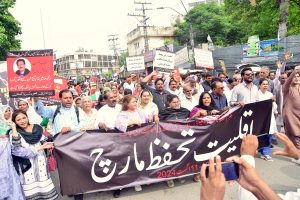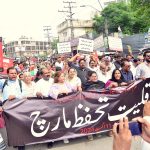
Minorities at rally shout slogans outside the Lahore Press Club on Aug. 11, 2024. (Christian Daily International-Morning Star News)
LAHORE, Pakistan (Christian Daily International–Morning Star News) – Despite attempts by the Pakistani government and Islamist groups to thwart protest rallies and marches, Christians in several cities came out in large numbers to mark National Minorities Day on Aug. 11, demanding an end to religious intolerance and abuse of blasphemy laws.
The government in 2009 designated Aug. 11 to acknowledge the contribution and dedication of religious minorities towards the country’s progress. The day also celebrates the historic speech of Pakistan’s founder, Muhammad Ali Jinnah, on Aug. 11, 1947, which promised to protect the rights of minorities like Christians, Hindus and Sikhs.
This year, however, the marches by Christians faced fierce opposition from Islamist groups, particularly the Tehreek-e-Labbaik Pakistan (TLP), Sunni Tehreek and the Jamiat Ulema-e-Islam-Fazl (JUI-F). These parties alleged that the rallies organized by the Christians were a “foreign conspiracy” seeking the abolition of the blasphemy laws.
In Lahore, capital of Punjab Province, police thwarted a 24-hour hunger strike camp announced by the Rawadari Tehreek (Movement for Equality) outside the Punjab Assembly. The camp’s protested against violent mob attacks against Christians accused of blasphemy.
“We had planned to start the hunger strike camp on Aug. 10 and culminate it with a rally on Aug. 11, but on Saturday evening a large police contingent blocked the National Council of Churches in Pakistan (NCCP) premises where we had congregated and refused to let us out,” Rawadari Tehreek’s Chairman Samson Salamat told Christian Daily International-Morning Star News.
Salamat said that senior police and security officials forced them to defer the hunger strike and gave them conditional permission to form a rally in front of the Lahore Press Club on Sunday (Aug. 11) instead of the planned venue of the Punjab Assembly.
“The police also beat up some of our members and detained two senior leaders at a police station for over eight hours,” he said. “They cited threats from the TLP and other extremist outfits as reasons for the curbs, but we told them that instead of surrendering to these groups, they should ensure the writ of the state and ensure our protection.”
The TLP, known for whipping up anger over blasphemy, has made headlines for controversial and radical statements and actions in recent years. The party was formed after the execution of Mumtaz Qadri, a police guard who assassinated the governor of Punjab, Salmaan Taseer, in 2011 for speaking in favor of Pakistan’s most high-profile blasphemy accused, Aasia Bibi.
In July, the deputy chairman of the TLP, Zaheerul Hassan Shah, in a public rally in Lahore, announced a 50 million-rupee (180,000 USD) prize on the head of the chief justice of Pakistan’s Supreme Court, Qazi Faez Isa, for announcing a verdict in favor of the Ahmadi religion and for speaking against the misuse of blasphemy laws.
On Aug. 6, the TLP wrote letters to the district government in leading cities like Karachi and Sukkur in Sindh Province, and Lahore, Faisalabad and Rawalpindi in Punjab Province, and the federal capital of Islamabad, warning the government of unrest if the permissions granted to Christians for holding the marches were not withdrawn immediately.
“We warn the government to cancel the permissions granted to minorities marches, as it is an attempt to malign the blasphemy laws, which will not be tolerated at any cost. Minorities are enjoying their constitutional rights in Pakistan and are free to practice their respective faiths, but no one will be allowed to disrespect our Prophet Muhammad,” states TLP letters addressed to the district administrations in Karachi and Islamabad.
Following the threats, the district governments in Karachi and Islamabad formally announced revocation of the permissions to Christian groups. The Karachi administration, however, took back the decision after Christian activists held meetings with senior government leaders and protested.
“We were denied to use our constitutional right to speak for persecuted minorities,” Salamat said, adding that the Lahore police also threatened to register cases against them.
He added that despite the police’s highhandedness and threats from extremist groups, around 1,000 Rawadari activists still managed to hold a rally outside the press club.
“We demanded an end to the misuse of the draconian blasphemy laws and violence against minorities, particularly Christians in Punjab,” Salamat said. “We also protested against the muzzling of our voices which is a violation of our constitutional rights.”
In the port city of Karachi, several hundred Christians and members from other minority communities held a gathering outside the Frere Hall. Dozens of TLP activists, meanwhile, set up a camp about 500 meters from the venue but did not attempt to disrupt the minorities’ gathering, as a large police contingent had been deployed there.
“The event is a big slap on the face for Tehreek-e-Labbaik Pakistan,” said Luke Victor, one of the march organizers. “Police erected barriers to prevent many participants from attending. Officials instructed us not to speak about the blasphemy law.”
Blasphemy, punishable by death in Pakistan, is a sensitive subject in conservative Muslim-majority Pakistan, where mere accusations have led to street lynchings. Human rights groups say Pakistan’s harsh blasphemy laws are often misused to settle personal scores.
Victor told Christian Daily International-Morning Star News that Islamist groups were spreading misinformation that the minorities wanted the blasphemy laws to be abolished.
“We did not raise the slogan to abolish or repeal the [blasphemy] law. Our slogan was that if you file a complaint, let the courts do their job. Do not burn Jaranwala, do not burn Nazeer Masih Gill,” he said, referring to mob attacks against Christians. “Those who burned my Bible, desecrated my cross and burned my church, are these not acts of blasphemy? Register cases against them and punish them too.”
Pastor Ghazala Shafique, while addressing the gathering, criticized the government for portraying itself as religiously tolerant while the “ground reality was different.”
“We want this sort of Pakistan where there is no discrimination in the name of religion,” she said. “That’s what sort of impression we want to give to the world; please make such sort of policies, action plans, strategies which can create harmony.”
A Senior Puisne judge of the Sindh High Court, Justice Naimatullah Phulpoto, also addressed the event.
“Pakistan’s constitution ensures all rights to minorities,” he said, adding that minorities in Pakistan have all social and economic rights. “It is the responsibility of the government to ensure these rights as per the constitution.”
Renowned Muslim activist Sheema Kirmani also voiced concerns about the lack of due rights for minorities.
“We will have to explain to our children that the white part of Pakistan’s flag represents minorities,” she said.
In Islamabad, a conference was organized by the Minorities Alliance Pakistan (MAP) to highlight the pressing issues faced by minority communities across the country. MAP Chairman Advocate Akmal Bhatti said that Pakistani society had fallen to extremism and terrorism due to the wrong policies of successive governments.
“Hate, prejudice and killings in the name of religion are increasing day by day, instilling fear and insecurity in the minority communities,” Bhatti said, according to a press statement. “The political leadership must play their role to develop Pakistan on the liberal and secular ideology of Jinnah.”
He said that among other discriminatory practices, tampering with data of the population census decreased the stated population of Christians, which clearly showed a biased mindset towards minorities. He urged all stakeholders, including government bodies, civil society organizations and the general public to take concerted actions against all discriminatory issues.
Meantime, in an open letter on National Minorities Day, the Human Rights Commission of Pakistan (HRCP) urged the government to take immediate action to safeguard the rights of religious minorities in the country.
The HRCP emphasized that the right to practice, profess and propagate one’s religion was enshrined in Articles 20 and 21 of the Constitution of Pakistan as fundamental rights and has been upheld by the Supreme Court in various rulings, particularly a landmark 2014 judgment.
The letter highlighted the alarming rise in mob violence, forced conversions, false blasphemy allegations, hate speech, and attacks on places of worship. It asserted that the atmosphere of fear and repression was a consequence of the Pakistani state’s long-standing accommodation of far-right religious groups, leading to an increasingly radicalized society.
The group urged the government to fully implement the Supreme Court’s 2014 judgment, including the establishment of an autonomous national commission for minorities and the protection of religious sites from violence and illegal occupation.
It also called on the state to take a firm stance against hate speech, incitement to violence, and mob attacks, ensuring that perpetrators are held accountable and that victims are compensated for any loss of life or property. The letter also demanded accountability for those making false blasphemy accusations and called on the parliament to debate the misuse of blasphemy laws.
The group also recommended stringent regulation of religious seminaries to prevent them from becoming breeding grounds for hatred against minorities and urged the government to criminalize forced conversions, which disproportionately affect girls and women from minority communities.
Pakistan ranked seventh on Open Doors’ 2024 World Watch List of the most difficult places to be a Christian, as it was the previous year.
If you would like to help persecuted Christians, visit https://morningstarnews.org/resources/aid-agencies/ for a list of organizations that can orient you on how to get involved.
If you or your organization would like to help enable Morning Star News to continue raising awareness of persecuted Christians worldwide with original-content reporting, please consider collaborating at https://morningstarnews.org/donate/?
###
© 2024 Christian Daily International-Morning Star News. Articles/photos may be reprinted with credit to Christian Daily International-Morning Star News. https://morningstarnews.org
Tweet: https://twitter.com/morningstarnewz/
Facebook: https://www.facebook.com/MorningStarNews
Morning Star News is a 501(c)(3) non-profit corporation that relies solely on contributions to offer original news reports of persecuted Christians. By providing reliable news on the suffering church, Morning Star News’ mission is to empower those in the free world to help and to encourage persecuted Christians that they are not forgotten or alone. For free subscription, contact [email protected]; to make tax-deductible donations, visit https://morningstarnews.org/donate/? or send check to Morning Star News, 34281 Doheny Park Rd., # 7022, Capistrano Beach, CA 92624, USA.
- Minorities at rally shout slogans outside the Lahore Press Club on Aug. 11, 2024. (Christian Daily International-Morning Star News)

